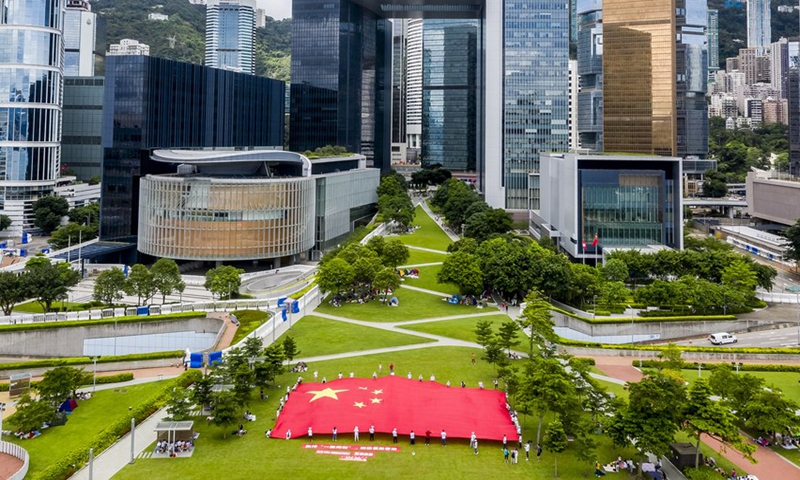
Aerial photo taken on June 25, 2020 shows people displaying China's national flag in Tamar Park in Hong Kong Special Administrative Region (HKSAR), China. Photo: Xinhua News Agency
Under the current situation of US-led Western countries suppressing Chinese intellectuals, a political advisor from Hong Kong suggested building the Hong Kong Special Administrative Region into a platform for returned Chinese researchers from around the world.
Hoffman Ma Ho-man, a member of the Chinese People's Political Consultative Conference (CPPCC) and member of the Hong Kong Culture Association, who came to Beijing for the ongoing two sessions - China's annual most important political event - offered the suggestion.
The US and its allies have been suppressing Chinese intellectuals, objectively providing a favorable external environment to attract Chinese talents back home, Ma told the Global Times on Wednesday. He suggested the Chinese central government support the establishment of Hong Kong as a platform to bring scientific researchers back home.
This move can help build the city into an international innovation center, providing a new growth driver for the local economy and serving China's innovation-driven strategy, Ma said in his proposal.
Ma said that China can make use of its overseas networks to facilitate the return of overseas researchers to Hong Kong Special Administrative Region.
The Chinese mainland can strengthen cooperation with and provide resources to Hong Kong universities and research institutes in core areas such as semiconductors, and it even can set up relevant laboratories and research institutes in the city, Ma suggested.
The central government can further encourage research cooperation in the Guangdong-Hong Kong-Macao Greater Bay Area, and provide tax and visa facilitation for Hong Kong researchers working in the area, Ma noted.
Ma also suggested establishing a mechanism between the mainland and Hong Kong under the framework of the Cybersecurity Law to relax data sharing regulations that do not involve national security, so as to accelerate the development of the city's scientific research.
Ma also suggested that China allow zero-tariff access on the mainland for research and technological products from Hong Kong, and include Hong Kong in the zero-tariff zone for semiconductor imports into the mainland market.
Hong Kong is strong in fundamental research, innovative finance and protection of intellectual property rights, which the mainland needs to enhance its capacity for independent research and development, make breakthroughs in core technologies as soon as possible, and achieve high-quality social development.
Therefore, Ma suggested the central government make good use of Hong Kong's strengths to serve the needs of the country, and support Hong Kong in becoming a platform for the country's foreign trade in high-technology products.
The political advisor said the suggestions are in line with the aim of China's 14th Five-Year Plan (2021-25), during which the country vows to attach great importance to innovation and take it as the primary core engine for high-quality development.




